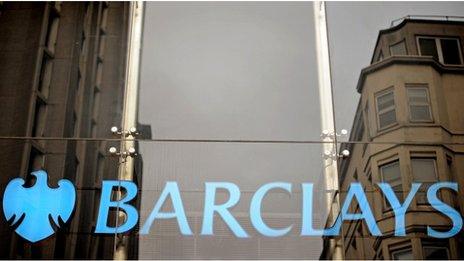Barclays: Almost everything you wanted to know about the bank's £12.8bn capital gap
- Published
- comments

For unashamed wonks (that's me, in case you wondered), there's lots of gripping stuff in today's announcement that the Bank of England's Prudential Regulation Authority is forcing Barclays to fill a "gap" in its capital resources of £12.8bn.
Here, in no particular order of importance, is what I think is important. And if you will indulge me, I will supply this gripping stuff (don't smirk) in the form of a question and answer.
Q) Why is the hole so big?
A) Because most big global banks are now perceived to have been running for many years with too little capital in their coffers as protection against losses. And that capital shortfall is seen to have been most severe for investment banks.
Q) So why is there such a big hole for Barclays and not for other big stock market banks?
A) Because Barclays is the one British bank with a large and global investment arm that competes with the likes of JP Morgan, Goldman Sachs and Morgan Stanley of the US.
Q) How is Barclays filling the £12.8bn hole?
Barclays will raise £5.8bn through a new share issue, to shore up its finances
A) By raising around £6bn from shareholders, by selling around £2bn of fancy new bonds (or "cocos", for the cogniscenti - poor you), and by shrinking its balance sheet by up to £80bn (because capital requirements, on the famous "leverage ratio", are set as a proportion of gross loans and investments).
Q) But if Barclays is shrinking its balance sheet, surely that means there will be a credit crunch, a drying-up of vital loans to small businesses and households?
A) Barclays' chief executive, Antony Jenkins, insisted to me that the flow of credit to the real economy in the UK would not shrink.
Q) How can Barclays shrink its loans and investments, and not be meaner with credit to people and small companies?
A) Because the cuts are being made in "potential future exposure on derivatives, securities financing transactions and liquidity pool assets".
Q) Speak English, for gawd's sake. What on earth does that mean?
A) It means Barclays will provide fewer financial transactions to big companies, life insurers and pension funds, inter alia, to help those giant institutions reduce their risks. And to be clear that will represent a tightening of credit for those customers, so there may be a negative economic impact.
Also, Barclays will reduce its involvement in the huge "repo" market for US government debt or Treasuries. That could contribute to an increase in borrowing costs for the US government (an increase in US government funding costs that is already under way for other reasons).
Q) Why on earth should shareholders provide £6bn to Barclays given that investing in banks has been a licence to lose money over the past six or seven years?
A) There has been a recovery in bank share prices in recent months. And Barclays is promising to increase what it pays shareholders in the form of dividends, from 30% of attributable profits to between 40% and 50% of attributable profits.
Q) But hang on a moment, if Barclays would be paying out more to shareholders, won't it be retaining less to augment its capital - and would therefore be doing too little to support future credit growth?
A) That is a risk.
Q) With all these new expensive capital requirements being heaped on Barclays' investment bank, and the planned shrinkage of the bank, will Barclays be put at a competitive disadvantage, and can it stay in investment banking?
A) This is a huge and important question. Jenkins believes there is a profitable future for Barclays Capital, the investment bank. But that future depends in part on whether there will be a level playing field between it and its US competitors.
Plans for new capital requirements on bank holding companies (that famous leverage ratio again) have recently been announced in the US. If they are implemented, Barclays Capital should be viable - in the sense that its costs should not be disproportionately higher than important overseas rivals.
Q) But there is an implication that investment banking is undergoing something of a revolution?
A) That is right. If investment banks are to make an acceptable return on capital in this new world of higher capital requirements, they will probably have to cut the pay of investment bankers (again, don't smirk) and/or increase charges to customers.
Q) Plainly this is big stuff. So who runs Barclays these days, its board or the regulator?
A) Well the regulator has imposed its will on Barclays, and all British banks, in respect of their capital needs, and in a way that rarely happened before the crash. The regulator has shown that it is the boss when it comes to the important parameters for how the banks can operate.
But Barclays' board had discretion over how to fill that huge £12.8bn gap in its capital. And Barclays won a bit of the argument, in that the regulator did ask Barclays for a plan to fill the gap by the end of 2013, but ultimately agreed with Barclays that June 2014 is the deadline.
PS - click here to hear my interview on all this with Barclays' chief executive, Antony Jenkins.